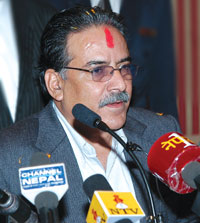|
|
In Rolpa, February 1996, Pushpa Kamal Dahal officially started the 'People's War', which has since claimed close to 15,000 Nepalis. That war stood on the cusp of being metamorphosed into an open political force in the wee hours of Wednesday. Historians will someday flesh out how Dahal led his underground guerillas to the globally televised press conference at Yak & Yeti, where he announced the beginning of the formation of a new Nepal. But if his recent behaviour gives any indication, what tactics does Dahal use to get what he wants?
Remain above the fray: Dahal is a master at giving the impression that he is above the rough and tumble of usual politics. It wasn't him, for instance, who went around asking Kathmandu Valley residents to provide food and shelter to comrades who were going to show up from all over Nepal for the Friday's million man rally. It was Kathmandu's residents who-abetted by reactionaries-misunderstood the comrades' polite requests for voluntary help. In his magnanimity, Dahal has cancelled the event. The Valley residents can now thank him for taking their worries into account. Besides, how can you not admire the man's selfless credentials? Unlike power-hungry politicians, he says that he is not even joining the interim government.
Answer with questions: Rewind and watch his interviews. A pattern emerges. He takes the question, flinches a little, but turns it around and throws it back in the form of a different question. Is violence justified? Didn't Nepali Congress too take up arms in the late 1940s to overthrow the Ranas? Are you sorry that so many people died for your cause? Why not ask the government first?
Blame others; take credit: Dahal's answers, when not in the form of questions, have two parts: blaming others for things that went wrong and taking credit for things that went right. The Jana Andolan II was a success only because the Maoists played a major role. The recent peace process almost got derailed because of other political parties' shortsightedness. Dahal even managed to take credit for having publicly apologized to the victims of the Madi bus massacre. Never mind that he did not even allow the press corps to be present in Madi. Nor did he mention that Madi residents appeared far less satisfied with his politically calculated PR stunt. In his book, it's the act alone-not the verifiable truth-which plays to the gallery.
Play to your audience: Under different circumstances, Dahal would have made an excellent PR executive. He's for free markets when meeting with businessmen, for women's rights when talking with women's groups, for providing compensations when with Maoist victims, for press freedom when having coffee with journalists and so forth. He's a man for all seasons who has painstakingly cultivated an image of physical likeability, speaking plainly, using stirring quotes from poets such as Gopal Prasad Rimal, and knowing when to smile for the cameras. Faced with someone who reminds you of an avuncular ad guy, which journalist is going to keep on daring to ask Dahal about his cadres' extorting small businesses, kidnapping people and murdering indiscriminately?
In the press conference, Dahal talked of forming a new Nepal. What remains to be seen is whether in that process Nepalis will also get to see the formation of a new Dahal.




